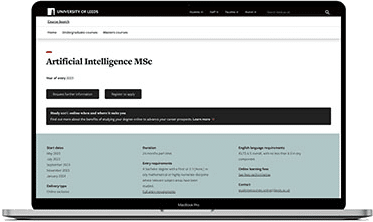Meet the Teaching Fellow for Artificial Intelligence (Robotics)
Artificial Intelligence
Dr Zeeshan is the Teaching Fellow for Artificial Intelligence, an 100% online MSc delivered by the University of Leeds School of Computing.
With a wealth of experience in the AI industry and a passion for robotics and reinforcement learning, he is proud to support artificial intelligence professionals with their studies.
In this Q&A, we explore his career journey to date, the latest research projects he’s a part of, and the benefits of studying online with the University of Leeds.
Learn more about our Artificial Intelligence courseQ: Could you tell us a little bit more about yourself, your experience and how you got to where you are today?
My name is Dr Muhammad Zeeshan Babar, I’m from Islamabad in Pakistan and a Teaching Fellow at the University of Leeds School of Computing. I joined the school in mid-2022, and I teach the Robotics module to Artificial Intelligence MSc students, supervising the module and helping them with their online studies.
Looking back on my career journey to date, I started out in robotics when studying for a bachelor’s degree in electronics, where I developed my interest in controlling robotic and autonomous systems. From there, I completed a Master’s in the same electronic engineering and went on to complete my Ph.D. in Robotics and Autonomous systems from the University of Genova, Italy. My area of specialization for my Ph.D. was system identification and optimal control design for autonomous robotics systems, so they can perform a task fully autonomously without human interaction.
After completing my Ph.D., I joined Surrey Space Centre as a Postdoctoral Researcher, working on learning-based algorithms for planetary rovers that explore the surface of Mars and collect samples and information.
Following that, I wanted to try out the AI industry itself, so I got a job with a Robotics start-up company based in Ljubljana, Slovenia called Airnamics. With them, I successfully deployed a 6DOF robotic manipulator which can pick up and place objects, eliminate faulty objects, fill trays with the correct ones, and so on.
Then I went back to teaching AI, first at the University of Edinburgh and then here at the University of Leeds as a Teaching Fellow, undertaking research and teaching on the online Artificial Intelligence Masters.
Q: What would you say is your main area of expertise within artificial intelligence and do you have any research interests?
I’m working in the Robotics area of AI, and I’m currently exploring the idea of reinforcement learning for robotics systems. It’s a very hot topic nowadays and working on these reinforcement learning algorithms is really interesting in addition to my main area of expertise.
Q: Tell us a little bit more about the online Artificial Intelligence Masters delivered by the University of Leeds.
The course is designed for students with a background in computer science or engineering. A basic understanding of robotics and machine learning is required, but it’s not purely for those who are ‘experts’ in the subject.
It covers all the basics of artificial intelligence and in terms of Robotics, it addresses localization, path planning, simultaneous localization, mapping, and more.
Q: The course is taught fully online. What is that like? And how much interaction do you have with the students?
The online course is interesting. All the content is available on the web for students to learn whenever it suits them best. There are video lectures, a range of modules, and an activity assigned to each available module.
Students need to undertake some hands-on coding to build their experience, so we organize two sessions every week: one which covers theory and another which covers the practical aspect.
If students ever need to have a chat or ask any questions, we also have open office hours where they can book some time to talk to us.
Q: Could you tell us a little more about the Robotics module that you teach?
The Robotics module covers both robotics and reinforcement learning – a type of machine learning technique that enables a robot to learn in an interactive environment.
The module is divided into six units which are delivered once a week. The first three units cover the robotics part, and units four, five, and six cover reinforcement learning. We aim to build basic knowledge in robotics, teaching students algorithms, motion planning, localization, path planning, and many more.
Once they have built this knowledge, the module concludes with a task where students have to apply reinforcement learning algorithms to control robots and move them around in an environment whilst avoiding collisions.
Q: Why did you choose to join the University of Leeds School of Computing?
The University of Leeds is ranked highly in the QS World University Rankings (World Top 100) which demonstrates its prestige.
Pairing that with the Leeds School of Computing, which has world-class facilities and teaching with a strong focus on research, it was a definite ‘yes’ when I was offered the opportunity to work here.
Being part of the school is a really nice experience. Everyone is so cooperative which helps build the course material and refine it to keep it up to date.
Q: Could you tell us about some of the research projects underway at the University of Leeds School of Computing?
There are several research projects underway which students can benefit from.
One of the projects I am currently working on involves physics with robotics on 2D materials to automate tasks which otherwise can take them weeks to complete. So, I am getting into that direction and sharing my ideas with students, so they benefit from solving real-world problems in the industry right now.
Q: What have some of the previous graduates of the School of Computing gone onto?
With this course, there are several avenues that students can go down.
They will be well placed to become good roboticists or get into any robotic industry that works with manipulators and artificial intelligence.
There are a lot of students who are working in the NHS as Data Scientists, and image processing which enhances cancer detection. They are getting their knowledge from the Artificial Intelligence Masters and applying it in their place of work.
Q: If you could give one piece of advice to someone considering studying Artificial Intelligence with the University of Leeds, what would it be?
The course is designed for people who are looking to reskill or enter AI as a working professional. It’s suited to anyone who wants to manage or plan solutions within their current organization, particularly if they are already in employment and seeking a higher level of study.
The course is purely AI-focused. It covers an extensive range of artificial intelligence, robotics and machine learning tools and techniques, so it’s open to everyone with an interest in the area.

Did you enjoy this blog? Here’s some related artificial intelligence content that you may be interested in:

Want to learn more about our online Artificial Intelligence course?
Check out the course content and how to apply.

